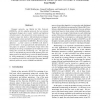Free Online Productivity Tools
i2Speak
i2Symbol
i2OCR
iTex2Img
iWeb2Print
iWeb2Shot
i2Type
iPdf2Split
iPdf2Merge
i2Bopomofo
i2Arabic
i2Style
i2Image
i2PDF
iLatex2Rtf
Sci2ools
94
Voted
IPPS
2007
IEEE
2007
IEEE
Energy-Aware Self-Stabilization in Mobile Ad Hoc Networks: A Multicasting Case Study
Dynamic networks, e.g. Mobile Ad Hoc Networks (MANETs), call for adaptive protocols that can tolerate topological changes due to nodes’ mobility and depletion of battery power. Also proactivity in these protocols is essential to ensure low latency. Self-stabilization techniques for distributed systems provide both adaptivity and proactivity to make it suitable for the MANETs. However, energyefficiency - a prime concern in MANETs with batterypowered nodes - is not guaranteed by self-stabilization. In this paper, we propose a node-based energy metric that minimizes the energy consumption of the multicast tree by taking into account the overhearing cost. We apply the metric to Self-Stabilizing Shortest Path Spanning Tree (SSSPST) protocol to obtain energy-aware SS-SPST (SS-SPSTE). Using simulations, we study the energy-latency tradeoff by comparing SS-SPST-E with SS-SPST and other MANET multicast protocols, such as ODMRP and MAODV.
Distributed And Parallel Computing | IPPS 2007 | MANET Multicast Protocols | Mobile Ad Hoc Networks | Node-based Energy Metric |
Related Content
| Added | 03 Jun 2010 |
| Updated | 03 Jun 2010 |
| Type | Conference |
| Year | 2007 |
| Where | IPPS |
| Authors | Tridib Mukherjee, Ganesh Sridharan, Sandeep K. S. Gupta |
Comments (0)

